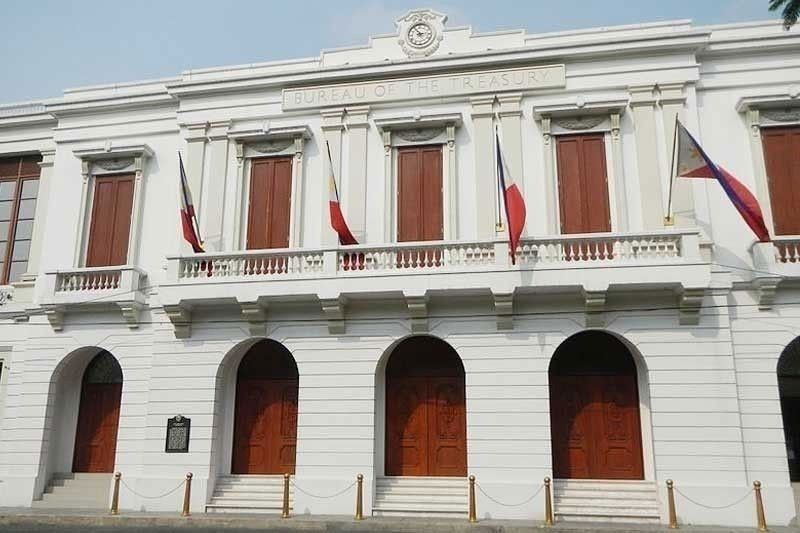Philippine budget surplus balloons in April

MANILA, Philippines — The Philippines posted a budget surplus for the second straight month in April, ballooning to P66.8 billion or 13.5 times the surplus recorded in the same period last year, as the acceleration in revenue collection outstripped the growth in government expenditures, according to the Bureau of the Treasury (BTr).
Last month’s surplus helped pull down the deficit for the the first four months of the year, narrowing by 34.6 percent to P204.1 billion from P311.9 billion in the same period last year.
Based on BTr data, actual government revenue collections went up by 26.7 percent to P440.7 billion in April from P347.9 billion a year ago.
The tax take of the Bureau of Internal Revenue (BIR) jumped by 40.2 percent to P336 billion from P239.6 billion amid the implementation of Revenue Memorandum Circular 5-2023 in line with Section 37 of Republic Act 10963 or the Tax Reform for Acceleration and Inclusion Act. The TRAIN law requires the filing of quarterly value-added tax returns within 25 days following the close of each taxable quarter wherein the transaction was recorded.
Revenues from the Bureau of Customs inched up by 2.9 percent to P67.6 billion in April from P65.7 billion a year ago.
Non-tax revenues slipped by nine percent to P37.09 billion in April from P40.75 billion last year as the income of the BTr fell by 28.9 percent to P18.3 billion due to the base effect of early remittances of dividends from government-owned and controlled corporations last year.
On the other hand, government spending inched up by nine percent to P373.9 billion from last year’s P343 billion due mainly to the subsidy release to the Philippine Health Insurance Corp., larger capital expenditures of the Department of Public Works and Highways and Department of Transportation, as well as higher interest payments for the month.
From January to April, government revenues increased by 11.2 percent to P1.26 trillion from P1.13 trillion, while spending inched up by 1.3 percent to P1.46 trillion from P1.44 trillion.
The BTr said the spending growth was tempered by the decline in transfers to local government units due to lower national tax allotment shares.
“Although in surplus, April’s budget balance is concerning on the expenditure side. Lower than expected expenditures will impact the country’s growth potential,” China Bank chief economist Domini Velasquez said.
Velasquez warned that revenues could also fall short in the coming months as the government would no longer enjoy last year’s high oil import price windfall.
Velasquez added that a slower gross domestic product (GDP) growth this year could also lead to lower income tax collections.
With the expected external headwinds, the Cabinet-level Development Budget Coordination Committee has set a slower GDP growth target of six to seven percent this year after its acceleration to 7.6 percent last year from 5.7 percent in 2021.
Velasquez noted that the proposed tax reforms such as the Passive Income and Financial Intermediary Taxation Act as well as VAT on digital services are expected to be implemented only in 2024.
“Moving forward, to remain prudent, we still think the government should fast-track revenue collection measures to keep the budget deficit in check and ease pressure to incur more debt especially now with current interest rates still elevated,” Velasquez said.
Michael Ricafort, chief economist at Rizal Commercial Banking Corp., said disciplined government spending helped narrow the budget deficit in recent months, partly through no more COVID lockdowns prospectively as a matter of policy priority as well as recent signals to rein in unnecessary government expenditures to help narrow the budget deficit and temper the increment on the outstanding national government debt.
“For the coming months, there is still a chance for a narrower budget deficit after the tax collection season in April 2023 amid further reopening of the economy toward greater normalcy, with no more restrictions recently and as a policy priority, going forward, thereby leading to increased sales, profits, employment, livelihood and other economic activities that fundamentally increased the government’s tax revenue collections,” Ricafort said.
He said still relatively high inflation could increase state expenditures. Higher interest rates could also add to the government’s borrowing costs and overall debt servicing bill, which could lead to wider budget deficits, unless offset by improvements in tax revenue collections.
- Latest
- Trending



























